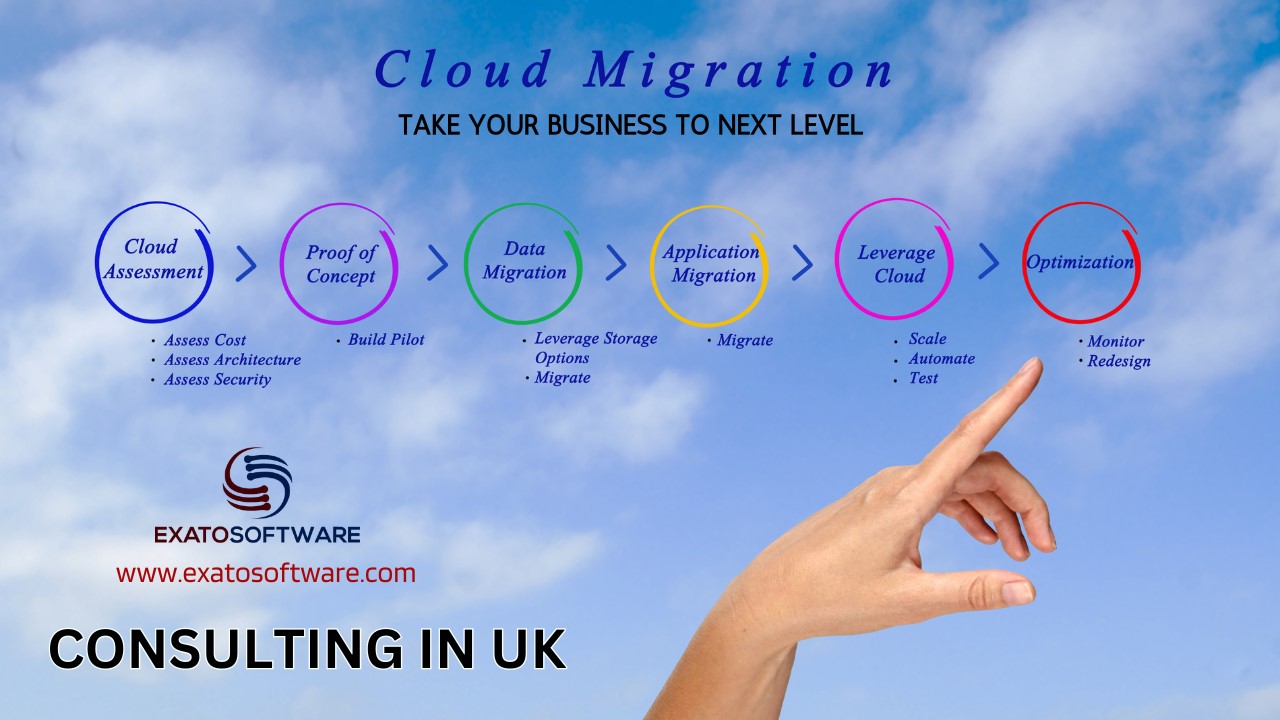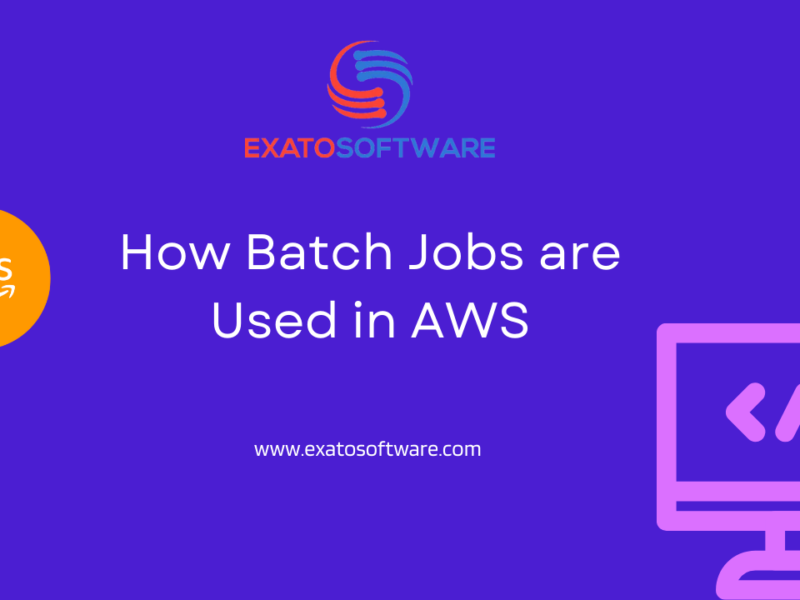Migrating an application to the cloud can enable organizations to achieve greater efficiency, innovation, agility, and cost savings. Along with these organizations also gain immensely by improving the security, reliability, and scalability of their application.
Migration is recommended to organizations so that they can keep their time-tested and reliable features that over a while have groomed and have jelled perfectly with the organization’s operations.
Proper, well-studied, and executed migration is done with minimal changes in the application, and old and trusted features remain as they are so that there is no confusion in the organization. Exato Software is providing cloud migration consulting services in the UK successfully and has let organizations achieve much more with their legacy applications.
Migrating an application to the cloud involves careful planning and consideration of various key areas to ensure a smooth transition and optimize performance, security, and cost-effectiveness. Here are the key areas you should focus on while migrating an application to the cloud:
1. Application Architecture Assessment: Evaluate the current architecture of the application to determine its suitability for cloud migration. Consider aspects such as scalability, availability, and resource utilization.
2. Cloud Service Selection: Choose the right cloud service model (IaaS, PaaS, SaaS) and cloud provider based on your application requirements, budget, and existing infrastructure.
3. Data Migration Strategy: Develop a data migration plan to transfer application data to the cloud securely and efficiently. Consider factors such as data volume, latency, and data residency requirements.
4. Security and Compliance: Implement robust security measures to protect data and applications in the cloud. This includes encryption, access control, identity management, and compliance with industry regulations (e.g., GDPR, HIPAA).
5. Performance Optimization: Optimize application performance in the cloud by leveraging cloud-native services, autoscaling, and load balancing. Monitor performance metrics closely and make adjustments as needed.
6. Cost Management: Estimate the cost of cloud resources and optimize spending by rightsizing instances, leveraging reserved instances, and using cost management tools provided by the cloud provider.
7. High Availability and Disaster Recovery: Design the application for high availability and implement disaster recovery mechanisms to minimize downtime and data loss. This may involve deploying across multiple availability zones or regions.
8. Networking and Connectivity: Set up networking infrastructure to ensure reliable connectivity between the application components and users. Consider factors such as bandwidth, latency, and network security.
9. Integration with Existing Systems: Ensure seamless integration with existing on-premises systems or other cloud services. This may involve implementing APIs, message queues, or data synchronization mechanisms.
10. Monitoring and Management: Implement comprehensive monitoring and management tools to track the health, performance, and security of the application in the cloud. Use automation for provisioning, scaling, and maintenance tasks.
11. Training and Skill Development: Provide training to the IT team to familiarize them with cloud technologies and best practices for managing applications in the cloud.
12. Testing and Validation: Conduct thorough testing of the migrated application to ensure functionality, performance, and security. This includes integration testing, load testing, and security testing.
These key areas need special attention to mitigate risks and maximize the benefits of migrating applications to the cloud. In our Cloud migration consulting in UK, we have always given special stress to approach cloud migration as a strategic initiative and involve all stakeholders to ensure a successful outcome.
Why Organizations need Cloud migration consulting in UK
Organizations generally choose to engage a consultant for migrating an application to the cloud. There are several compelling reasons to do so.
1. Expertise and Experience: Cloud consultants have specialized knowledge and experience in cloud technologies, architectures, and best practices. They can provide valuable insights and guidance based on their previous engagements with similar projects, helping organizations avoid common pitfalls and achieve successful outcomes.
2. Strategic Planning: Consultants can assist organizations in developing a strategic roadmap for cloud migration tailored to their specific needs and goals. This includes assessing the current environment, defining objectives, selecting the right cloud services, and creating a migration plan that aligns with the organization’s business objectives.
3. Risk Mitigation: Cloud migration projects involve inherent risks related to security, compliance, performance, and cost. Consultants can help organizations identify and mitigate these risks by implementing robust security measures, ensuring compliance with regulations, optimizing performance, and managing costs effectively.
4. Cost Optimization: Cloud consultants can help organizations optimize costs by analyzing their existing infrastructure, estimating cloud costs, and recommending cost-saving strategies such as rightsizing instances, leveraging reserved instances, and optimizing resource utilization.
5. Technology Selection: With the multitude of cloud services and providers available, choosing the right technology stack can be challenging. Consultants can provide unbiased recommendations based on their expertise and knowledge of the latest trends and advancements in cloud technology.
6. Change Management and Training: Cloud migration often requires organizational change and upskilling of staff to adapt to new processes and technologies. Consultants can assist in change management efforts by providing training and support to ensure a smooth transition for employees.
7. Vendor Management: For organizations working with multiple cloud vendors or service providers, consultants can help manage vendor relationships, negotiate contracts, and ensure alignment with the organization’s requirements and objectives.
8. Accelerated Time-to-Value: By leveraging the expertise and experience of cloud consultants, organizations can accelerate the migration process, reduce time-to-market, and realize the benefits of cloud adoption more quickly.
9. Independent Assessment: Consultants provide an independent assessment of the organization’s cloud readiness, identifying strengths, weaknesses, and areas for improvement. This impartial perspective can help validate the organization’s cloud strategy and provide confidence to stakeholders.
10. Scalability and Flexibility: Cloud consultants can help design cloud architectures that are scalable, flexible, and resilient to meet the evolving needs of the organization. They can also assist in implementing cloud-native technologies and practices that enable agility and innovation.
Overall, engaging a consultant for migrating an application to the cloud can help organizations navigate the complexities of cloud adoption, minimize risks, and maximize the value of their investment in cloud technology.
Why should Organizations migrate their applications on the cloud?
It will be much easier to understand why so many organizations have opted for Cloud migration services in the UK to get their apps on cloud.
Migrating an application to the cloud offers numerous benefits for organizations across various aspects of their operations.
1. Scalability: Cloud platforms provide on-demand scalability, allowing organizations to quickly scale up or down resources based on fluctuating demands. This elasticity enables them to handle spikes in traffic, accommodate growth, and optimize resource utilization, leading to improved performance and cost efficiency.
2. Cost Savings: Cloud migration can lead to cost savings by eliminating the need for upfront hardware investments, reducing maintenance and operational costs, and optimizing resource usage through pay-as-you-go pricing models. Additionally, cloud providers offer economies of scale, enabling organizations to benefit from lower infrastructure costs.
3. Flexibility and Agility: Cloud environments offer greater flexibility and agility, allowing organizations to innovate faster and respond quickly to market changes. Developers can provision resources on-demand, experiment with new technologies, and deploy updates more frequently, leading to faster time-to-market and competitive advantage.
4. Enhanced Security: Cloud providers invest heavily in security measures and compliance certifications, offering robust security features such as encryption, access controls, threat detection, and identity management. Migrating to the cloud can improve overall security posture by offloading security responsibilities to the provider and leveraging their expertise in cybersecurity.
5. Improved Reliability and Availability: Cloud providers offer high levels of reliability and availability through redundant infrastructure, data replication, and geographically distributed data centers. This ensures continuous uptime and resilience against hardware failures or disasters, minimizing downtime and data loss.
6. Global Reach: Cloud platforms operate on a global scale, providing organizations with the ability to reach customers and users worldwide. By leveraging distributed infrastructure and content delivery networks (CDNs), organizations can deliver low-latency experiences and improve performance for users across different geographic regions.
7. Data Analytics and Insights: Cloud platforms offer powerful data analytics and machine learning capabilities, enabling organizations to derive valuable insights from large volumes of data. By leveraging cloud-based analytics services, organizations can gain deeper insights into customer behavior, optimize operations, and drive data-driven decision-making.
8. Collaboration and Integration: Cloud environments facilitate seamless collaboration and integration across teams and systems. Organizations can leverage cloud-native services, APIs, and integrations to connect disparate systems, streamline workflows, and improve communication and collaboration among employees, partners, and customers.
9. Disaster Recovery and Business Continuity: Cloud providers offer built-in disaster recovery and backup solutions, enabling organizations to implement robust disaster recovery plans and ensure business continuity. By replicating data across multiple data centers and regions, organizations can recover quickly from outages or data loss incidents.
10. Environmental Sustainability: Cloud computing can contribute to environmental sustainability by reducing energy consumption and carbon emissions associated with on-premises data centers. Cloud providers optimize resource utilization and energy efficiency, leading to a smaller carbon footprint and a more environmentally friendly IT infrastructure.
If you are using an application that fits in your organization’s operational hierarchy perfectly, to enhance its productivity and make it a more useful asset for expanding your business feel free to reach out for our Cloud migration services in the UK.
The technology is changing at a rapid pace and the organizations that make timely and optimum use of technology are always at the forefront in generating new business and earning higher revenue.



